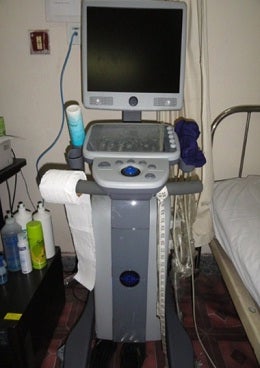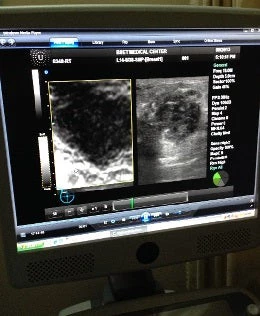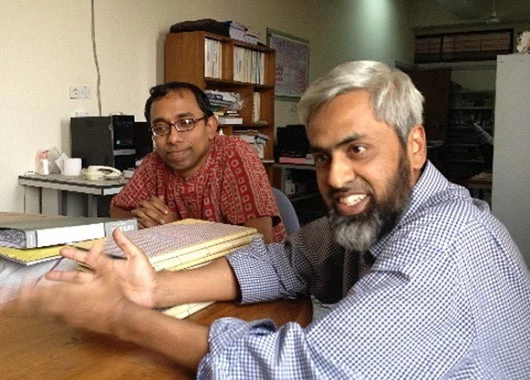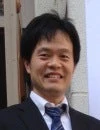“Thanks to our research program, we have been able to save the lives of at least 10 women by detecting their breast cancer at early stages,” enthusiastically says Dr. Md. Kamrul Hasan, a professor at Department of Electrical and Electronic Engineering (DEEE), Bangladesh University of Engineering and Technology (BUET), Dhaka.
Dr. Hasan is the manager of the cancer detection research project, which is one of the sub-projects awarded with research grants from the Academic Innovation Fund (AIF) program under the Higher Education Quality Enhancement Project (HEQEP). Faculty members and research students of the department joined together for the research project.
Lack of access to research grants and proper research environment has long been a major headache for researchers in developing countries like Bangladesh, especially in fields of science and technology. Bangladeshi scholars, who go abroad for their studies, often prefer to stay back in the host countries out of concern for availability of research facilities and financial resources indispensable for pursuing their academic work.
Even for a seasoned researcher like Dr. Hasan, access to research grants does not come easy in Bangladesh.
“The AIF was the first major research fund for me. No other research grants are available for researchers in BUET except for small grants from the university and some government agencies,” explained Dr. Hasan.
 The AIF program addresses such challenges by providing much-needed research and development grants to Bangladeshi universities through a transparent competitive funding mechanism. With the AIF grant of about US$120,000, Dr. Hasan’s research project aims at enhancing elasticity imaging technique for breast cancer detection and characterization which may assist tumor detection and classification in the absence of sufficient number of experienced healthcare professionals in Bangladesh. His sub-project acquired an ultrasound-based elastography machine and its accessories, installed them at BUET Medical Center, and developed an enhanced elasticity imaging technique. So far, 371 patients have been tested for breast cancer under the sub-project. Patients are referred by a surgeon and scanned by two radiologist with whom Dr. Hasan has a research collaboration agreement. With elasticity imaging technique as a complementary diagnostic modality of conventional ultrasonography, it has become easier to detect and distinguish malignant tumors using ultrasound scans. This greatly helps Bangladesh physicians to make more accurate diagnoses of breast tumors and spare patients from unnecessary invasive biopsies. Scholarly contribution of his sub-project is also noteworthy. In this research project, Dr. Hasan has published six international journal articles, and four more publications are currently in preparation.
The AIF program addresses such challenges by providing much-needed research and development grants to Bangladeshi universities through a transparent competitive funding mechanism. With the AIF grant of about US$120,000, Dr. Hasan’s research project aims at enhancing elasticity imaging technique for breast cancer detection and characterization which may assist tumor detection and classification in the absence of sufficient number of experienced healthcare professionals in Bangladesh. His sub-project acquired an ultrasound-based elastography machine and its accessories, installed them at BUET Medical Center, and developed an enhanced elasticity imaging technique. So far, 371 patients have been tested for breast cancer under the sub-project. Patients are referred by a surgeon and scanned by two radiologist with whom Dr. Hasan has a research collaboration agreement. With elasticity imaging technique as a complementary diagnostic modality of conventional ultrasonography, it has become easier to detect and distinguish malignant tumors using ultrasound scans. This greatly helps Bangladesh physicians to make more accurate diagnoses of breast tumors and spare patients from unnecessary invasive biopsies. Scholarly contribution of his sub-project is also noteworthy. In this research project, Dr. Hasan has published six international journal articles, and four more publications are currently in preparation.
Modern technologies – often developed in the context of developed countries – sometime require local adaptation to meet particular requirements of users in developing countries like Bangladesh. Inadequate diagnostic ability of physicians is a case in point. Home-grown innovations such as Dr. Hasan’s enhanced imaging technique are the key to local adaptation of imported technologies as well as creation of innovative products and services that cater to the needs of Bangladeshis.
One day, Dr. Hasan wishes, the medical professionals in Bangladesh will be able to enjoy the benefit of the enhanced elastrography as a non-invasive diagnostic tool to detect breast cancers at earlier stages and reduce breast cancer-related mortality in Bangladesh.

Some of the important issues which still need to be addressed are sustainability of the achievements of the sub-projects as well as the transparent framework for competitive research grants. Even so, the university community is hopeful as the AIF program takes the first crucial step in laying the foundation for better learning and research in the higher education sector of Bangladesh.
Feature Story: Bangladesh: Connecting Minds in Higher Education



Join the Conversation